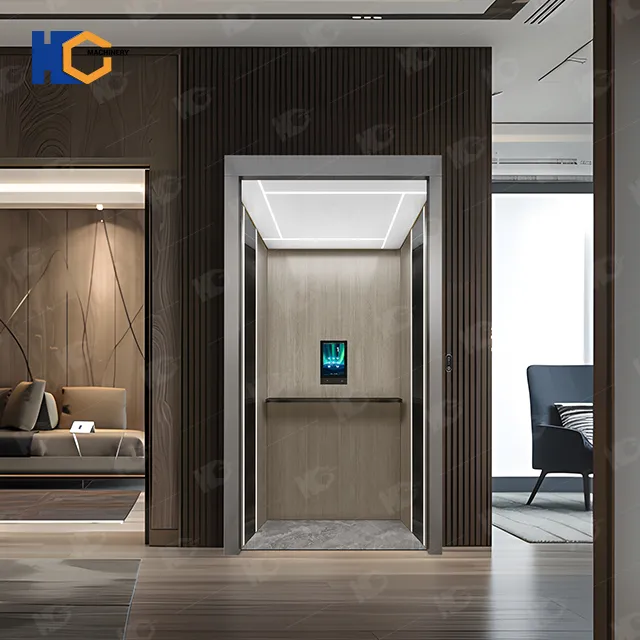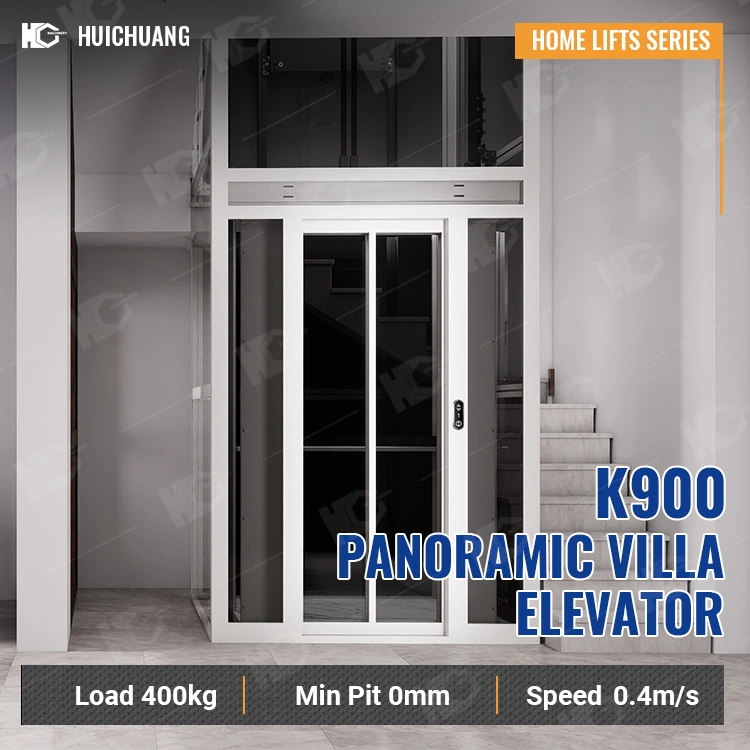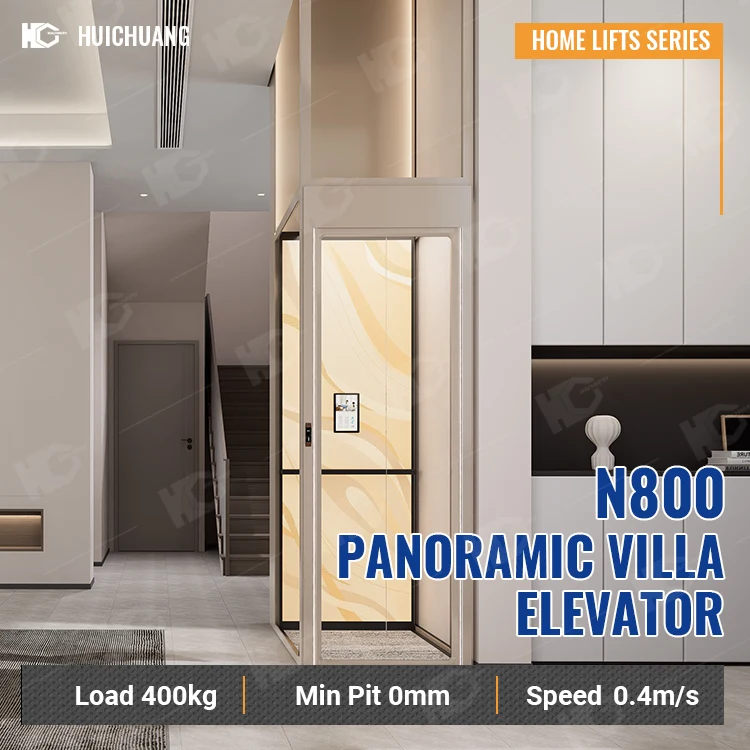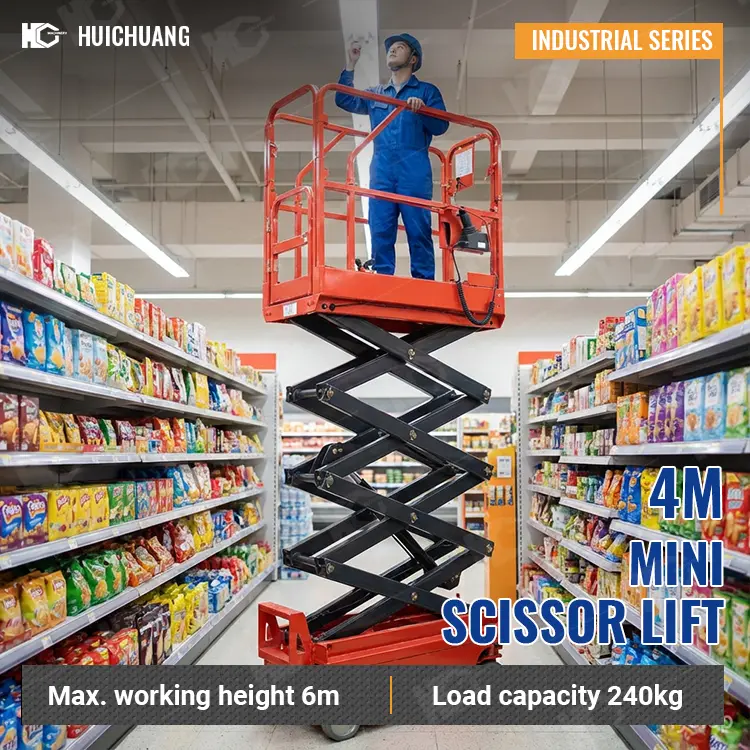Adding a small home elevator is a convenient and practical solution for multi-level homes, especially for elderly or mobility-challenged individuals. The cost of installing a small home elevator varies depending on factors such as the number of floors, elevator type, and customization options. This article will break down the typical costs, provide a specifications table, and introduce the elevator’s functions and safety features for 2-story to 6-story installations.
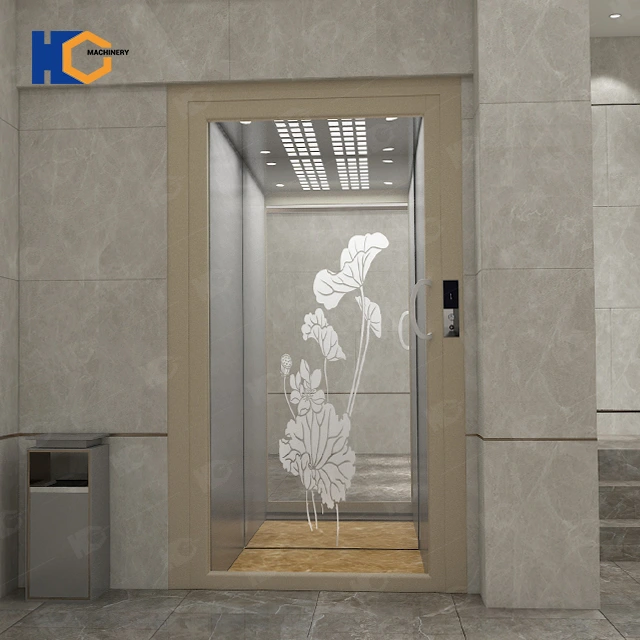
Small Home Elevator Specifications Table
| Specification | Description |
|---|---|
| Elevator Type | Hydraulic, Traction, Pneumatic, Cable, or Chain |
| Capacity | 200-400 kg (2-4 passengers) |
| Travel Speed | 0.2-0.4 meters per second |
| Power Source | 220V or 380V (depending on the type) |
| Cabin Size | Customizable; typically 0.8m x 0.9m or 1m x 1.2m |
| Door Type | Sliding doors or swing doors |
| Interior Finishes | Stainless steel, wood paneling, glass |
| Control System | Microprocessor-based control panel, automatic levelling |
| Noise Level | Low noise, 40-50 dB depending on the model |
| Compliance | CE, TUV, or equivalent safety certifications |
| Floor Travel Range | 2-6 stories |
| Backup Power | Uninterruptible power supply (UPS) for emergency use |
| Warranty | 1-2 years with service options |
Elevator Functions
Smooth and Quiet Operation
Small home elevators are designed for smooth and quiet movement, making them ideal for residential use. The use of hydraulic or traction systems helps reduce noise, while pneumatic elevators are virtually silent.
Compact and Customizable Design
These elevators are compact enough to fit into small spaces, with customizable cabin sizes and finishes. You can choose from a variety of materials, such as stainless steel, glass, or wood for the interior design, ensuring the elevator matches your home's aesthetic.
Energy Efficient
Many small home elevators come with energy-saving features, such as LED lighting and automatic power-off functions when idle. Pneumatic elevators require less energy due to their air-driven system, making them an eco-friendly option.
User-Friendly Control Panel
The control system features a microprocessor-based panel that is easy to use, with one-touch buttons for floor selection and automatic levelling. Most home elevators also come with voice prompts and an emergency communication system.
Compact Footprint
Home elevators are designed to occupy minimal space, requiring little to no additional room for a machine room. Models like hydraulic and traction elevators typically have the smallest footprints, making them ideal for retrofitting into existing homes.
Safety Features
Emergency Stop and Alarm System
Each elevator is equipped with an emergency stop button and an alarm system, allowing users to stop the elevator and alert others in case of an emergency.
Uninterruptible Power Supply (UPS)
In the event of a power outage, the elevator is equipped with a battery backup system that allows it to descend to the nearest floor and open the doors safely.
Safety Sensors
Door sensors prevent the elevator from closing if there is an obstruction, while floor-level sensors ensure that the cabin levels perfectly at each floor for safe entry and exit.
Overload Protection
The elevator includes a weight sensor that prevents it from operating if the load exceeds the specified capacity, ensuring the safety of the users.
Automatic Emergency Brake
The elevator system includes an automatic braking mechanism that activates if there is a failure in the cable or traction system, preventing sudden falls.
Small Traction Home Elevator Price
Table 1: Traction Home Elevator Cost by Building Height. This is the price of our small hydraulic elevator, supplied directly from our factory.This price includes customization of some parts and full after-sales service.If you would like to obtain pricing for bulk orders of small Traction Home Elevator, please contact us directly.
| Building Height | Estimated Price Range (USD) | Practical Notes |
|---|---|---|
| 2-Story | USD 7,500 – 14,000 | Entry-level traction system, compact MRL models are common |
| 3-Story | USD 8,000 – 15,500 | Slightly higher cost due to longer rails and travel height |
| 4-Story | USD 8,600 – 16,800 | Smooth ride and energy efficiency become clear advantages |
| 5-Story | USD 9,500 – 17,900 | Traction systems outperform hydraulics in speed and efficiency |
| 6-Story | USD 10,900 – 18,600 | Usually the recommended solution for residential buildings |
The cost of a small traction home elevator is closely related to building height, but the increase is gradual and predictable. Traction elevators use a motor, steel ropes, and a counterweight system, which makes them highly efficient and stable, especially as travel height increases. For low-rise residential buildings, such as two- or three-story homes, traction elevators are already competitively priced and offer smooth, quiet operation that many homeowners prefer.
As the number of floors increases from four to six, small traction elevators begin to show clear technical and economic advantages. The higher price at greater heights is mainly due to longer guide rails, increased travel distance, and more precise control systems required for safety and ride comfort. However, these costs are not sudden jumps; they scale logically with the structure and physics of the system.
For villas, duplex homes, and modern residences with glass sightseeing elevator designs, traction elevators are often the preferred solution. They consume less energy over time, require less maintenance compared to hydraulic systems, and provide better long-term value. This makes traction home elevators especially suitable for buildings with 4 to 6 floors, where efficiency, comfort, and durability become more important than the lowest initial price.
Small Hydraulic Home Elevator Price
Table 2: Hydraulic Home Elevator Cost by Building Height,This price comes from the sales price of our elevator factory.
| Building Height | Estimated Price Range (USD) | Practical Notes |
|---|---|---|
| 2-Story | USD 3,800 – 9,700 | Lowest initial cost, ideal for very small homes |
| 3-Story | USD 4,600 – 11,300 | Still cost-effective if space allows hydraulic installation |
| 4-Story | USD 5,500 – 12,400 | Cost rises faster due to larger hydraulic components |
| 5-Story | USD 7,500 – 14,500 | Many buyers begin comparing traction elevators here |
| 6-Story | USD 8,500 – 16,500 | Reachable, but usually less efficient than traction systems |
Small hydraulic home elevators are known for their relatively low initial cost, particularly in low-rise residential buildings. They operate using an oil-powered hydraulic cylinder, which provides strong lifting force and a simple mechanical structure. For two- and three-story homes, hydraulic elevators are often the most affordable option, making them attractive to homeowners with limited budgets or straightforward installation requirements.
As building height increases, the cost of Small hydraulic home elevators rises more noticeably. This is mainly because taller buildings require larger hydraulic cylinders, stronger oil systems, and additional safety components. At four floors and above, the price difference between hydraulic and traction elevators begins to narrow, and buyers often start comparing long-term performance rather than just upfront cost.
Hydraulic elevators typically consume more energy and operate at slower speeds, especially in taller buildings. They also require more installation space for the hydraulic system. While hydraulic elevators can reach up to six floors, they are generally better suited for low-rise applications where simplicity and lower initial investment are the main priorities. For homeowners planning future expansion or long-term energy savings, this is an important factor to consider when evaluating total cost.
Market price for 2-6 Story Elevators
| Floors | Estimated Price (USD) | Comments |
|---|---|---|
| 2-Story | $15,000 - $25,000 | Suitable for smaller homes with limited space |
| 3-Story | $20,000 - $30,000 | Ideal for homes with standard vertical space |
| 4-Story | $30,000 - $40,000 | Offers versatility for mid-sized homes |
| 5-Story | $40,000 - $55,000 | Requires higher capacity systems |
| 6-Story | $55,000 - $75,000 | Best for larger homes, more customization |
Note: Prices may vary based on the elevator type (hydraulic, traction, pneumatic), customization options, and location. Installation costs, taxes, and permits are typically additional.
The market cost of installing a small home elevator can vary significantly based on the number of floors and the type of elevator chosen. For a standard 2-story home, the investment typically ranges from $15,000 to $25,000, while a 6-story elevator installation could cost as much as $75,000. Regardless of the size, home elevators offer a convenient, energy-efficient, and safe solution for multi-level residences, providing mobility and accessibility to all family members.
By choosing a small home elevator, you can enhance your home’s value and convenience while ensuring that your space is future-proofed for accessibility needs.
Installation and Maintenance Costs of Small Home Elevator
The cost of installing and maintaining a small home elevator can be broken down into two main components: construction (installation) costs and ongoing maintenance costs. These costs vary based on the type of elevator, number of floors, customization, and location. These costs are based on market experience and different regions have different pricing systems; they are for reference only.
1. Construction (Installation) Costs
The construction cost of a small home elevator includes the purchase price of the elevator itself, labor, and any modifications needed to fit the elevator into the home. Here is a breakdown of the key factors affecting installation costs:
| Component | Estimated Cost (USD) | Description |
|---|---|---|
| Elevator Purchase | $15,000 - $75,000 | The main cost depends on the number of floors (2-6) and the type of elevator (hydraulic, traction, pneumatic). |
| Installation Labor | $5,000 - $15,000 | Includes the cost of installing the shaft, elevator, and electrical systems. |
| Shaft Construction | $2,000 - $5,000 | For homes without a pre-existing shaft, this is the cost of building one. |
| Electrical Wiring | $1,000 - $3,000 | Cost of upgrading or installing electrical systems to power the elevator. |
| Permits and Inspections | $500 - $2,500 | Local regulations may require permits, inspections, and adherence to building codes. |
| Customization (interior finishes, doors, etc.) | $2,000 - $10,000 | High-end finishes and materials will increase the cost. |
Total Installation Cost Estimate:
2-Story Home: $20,000 - $35,000
3-Story Home: $25,000 - $40,000
4-Story Home: $35,000 - $50,000
5-Story Home: $45,000 - $60,000
6-Story Home: $55,000 - $75,000
Note: Installation costs can be higher if major structural changes are needed or if the home requires extensive electrical upgrades.
651733.webp)
2. Maintenance Costs
Once the elevator is installed, there are ongoing maintenance costs to ensure the elevator functions safely and efficiently. Regular maintenance includes inspections, servicing, and replacement of worn-out parts. Here is a breakdown of maintenance costs:
| Component | Estimated Cost (USD) | Description |
|---|---|---|
| Annual Maintenance Contract | $500 - $2,000 per year | Covers regular inspections, servicing, and minor repairs. Most homeowners opt for annual maintenance contracts to prevent breakdowns. |
| Inspection Fees | $100 - $300 per inspection | Regular safety inspections may be required by local regulations. |
| Part Replacements (over time) | $300 - $2,000 per part | Depending on usage, parts like cables, hydraulic fluids, or control panels may need to be replaced after several years. |
| Battery Backup Replacement | $200 - $400 (every 3-5 years) | For elevators with UPS systems, the battery will need replacement after several years of use. |
| Unscheduled Repairs | $300 - $2,500 per occurrence | In case of mechanical or electrical failure, repair costs vary based on the severity of the issue. |
Total Annual Maintenance Costs:
Basic Maintenance: $500 - $2,000 per year
Part Replacements/Repairs: Varies; typically $300 - $2,500 per occurrence
Over 10 Years: $5,000 - $15,000 (assuming regular servicing and minor part replacements)
Factors That Influence Maintenance Costs
Elevator Type:
Hydraulic Elevators: Require regular maintenance of hydraulic fluids and parts, which can be more expensive than traction or pneumatic models.
Traction Elevators: Tend to have fewer moving parts and may have lower maintenance costs over time.
Pneumatic Elevators: These require minimal maintenance compared to hydraulic systems because they are air-powered, reducing the need for regular mechanical service.
Frequency of Use:
Elevators used daily will require more frequent maintenance than those used occasionally. The more frequently an elevator is used, the faster parts wear down, leading to higher maintenance costs.
Age of the Elevator:
As the elevator ages, certain parts may wear out and need replacement. Over time, the cost of maintaining the elevator may increase due to part replacements and the need for upgrades.
Warranty and Service Contracts:
Many manufacturers offer 1-2 year warranties, during which repair and maintenance costs may be covered. After the warranty expires, homeowners often opt for service contracts to cover maintenance, which helps reduce the cost of unexpected repairs.
Conclusion
When choosing a small home elevator, the decision usually comes down to building height, long-term efficiency, and budget. The two most common options—traction and hydraulic home elevators—serve different needs and price expectations.
A small traction home elevator typically costs between USD 7,500 and USD 18,600, covering residential buildings from 2 to 6 floors. While the initial investment is higher than hydraulic systems at lower heights, traction elevators offer smoother operation, better energy efficiency, and lower long-term maintenance costs. They are especially recommended for 4 to 6 story homes, modern villas, and glass sightseeing elevator designs where comfort and reliability matter most.
A small hydraulic home elevator generally falls within a price range of USD 3,800 to USD 16,500. These systems are most cost-effective for 2 to 3 story homes, where their simple structure and strong lifting force keep upfront costs low. However, as building height increases, hydraulic elevators become less efficient and their cost advantage gradually decreases.
In practical terms, homeowners with low-rise buildings and limited budgets often choose hydraulic elevators, while those planning taller residences or long-term use usually find traction elevators to be the more balanced and future-proof solution.
By investing in regular maintenance and opting for a reliable elevator model, homeowners can enjoy the convenience and safety of a small home elevator with minimized long-term costs.
FAQ
1. What is a small home elevator?
A small home elevator is a compact vertical lift designed for residential use, typically serving 2–4 floors with a load capacity of 250–400 kg. It helps improve accessibility for elderly, children, or mobility-impaired users.
2. How much space is required to install a small home elevator?
Most models require a shaft size of 900 mm × 900 mm to 1500 mm × 1500 mm. Some shaftless or pneumatic elevators need less space and can be installed in corners or beside staircases.
3. What is the typical cost of a small home elevator?
China factory price (standard 2–3 floors): USD 8,000–15,000
Imported with installation in developed markets: USD 20,000–35,000
Price depends on customization, travel height, design, and safety standards.
4. Do small home elevators require a machine room?
Not always. Many modern designs are machine-room-less (MRL), meaning the drive system fits inside the shaft, saving space and reducing installation cost.
5. How much electricity does a small home elevator use?
A typical home elevator uses about 1.5–3 kW per hour while running. Standby energy consumption is low, similar to a household appliance.
6. What safety features should I look for?
Emergency stop & alarm
Battery-powered emergency lowering
Automatic door locks
Overload protection
Non-slip floor and handrails
Compliance with EN81-41, CE, or ASME standards
7. How long does it take to install a small home elevator?
Installation usually takes 7–15 days depending on site conditions, customization, and number of floors.
8. What maintenance is required?
Routine maintenance is needed every 6–12 months. Checks include lubrication, electrical testing, safety system inspection, and cleaning. Service contracts are usually available from suppliers.
9. Can small home elevators be customized?
Yes. Buyers can customize:
Cabin size & design
Door type (swing, sliding, automatic)
Control panel
Glass panels or panoramic view
Color and finishes
10. What should I consider when choosing a supplier?
Certifications (CE, ISO, TUV)
Minimum order quantity (MOQ) if bulk purchasing
After-sales service & spare parts availability
References from past projects
Ability to provide OEM/ODM customization
